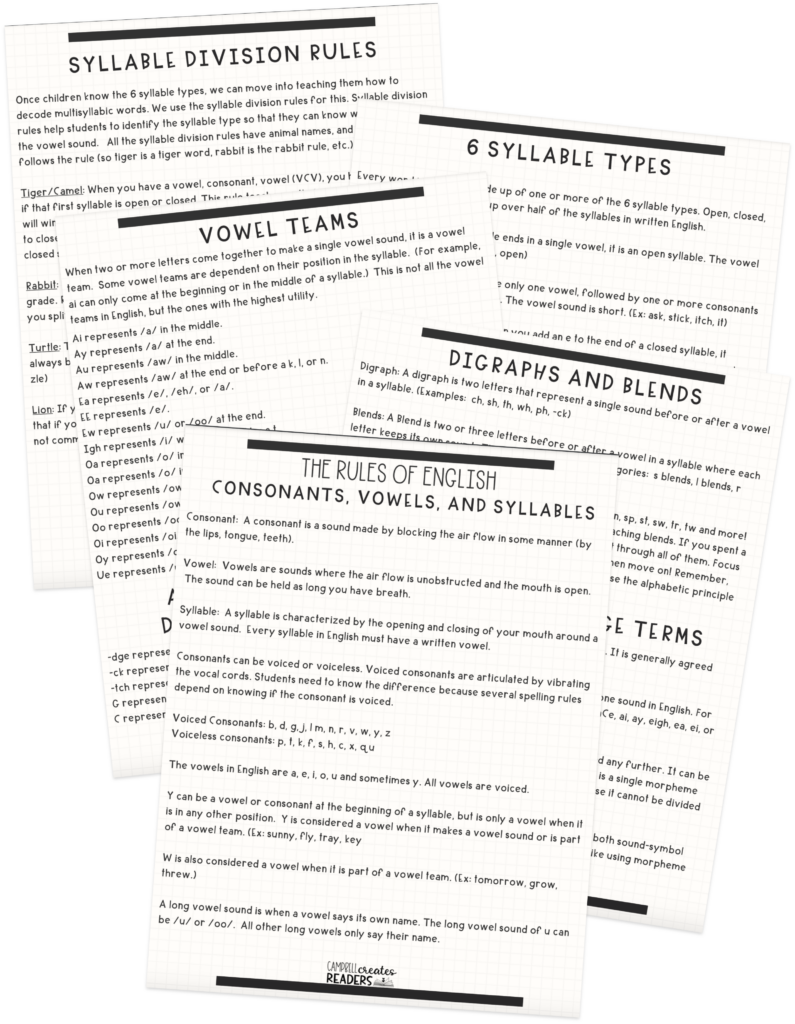
Share This:
This was my first year where I fully implemented more evidenced-based practices in my intervention groups (AKA I followed the Science of Reading). In March 2020 when the world shut down, I had just heard the term Science of Reading for the first time. I was attempting to teach with both balanced literacy AND structured literacy formats. I would teach a phonics skill at the beginning of my lessons before moving into an LLI lesson with leveled texts.
We left school in March 2020. When I returned in June to clean up, I had to remove my cueing strategy cards from the wall. That’s how new this is to me: I’ve still got that new car smell.
We came back to school this fall, fully in person the entire year, and it marked the first year where I could finally implement all the new knowledge I had about teaching reading. This year, I’ve taught over 50 students in grades K-5. As much knowledge as books and research gave me, it is the children who have really given me ways to tweak my instruction to help them become proficient readers. Today, I thought I’d share some reflections on what lessons I learned during my first real year of structured literacy.

For almost a decade, I let a level dictate how I taught my children. Despite shouting from the rooftops that “children are not levels,” I continued to teach them according to their level. If you were a level J, my goal was to give you as many level J books as you needed to get to a Level K. I might teach some phonics, but it was really “guided” by the texts. It was not the student, the standards, or a scope and sequence that determined what I taught. It was a level.
Now, I teach children according to their needs. I always refer back to Scarborough’s Reading Rope. As an interventionist, if my children are lacking the word recognition strand, I MUST work on the word recognition strand. I do not have enough time to do deep delves into both the language comprehension strand and the word recognition strand. While I might do some things to support language comprehension, I know that without immediate, effortless decoding, my children will never be successful readers.
So what exactly does that look like this year?? In kindergarten and beginning first grade, that means I am working hard and fast to teach children letter sounds and boost their phonemic awareness. I want my kiddos reading and spelling CVC words as soon as possible. Starting in first grade and beyond, it is all about explicit and systematic phonics instruction. I am teaching children how sounds are represented by graphemes, and how to make the connection between the two.
I had one group this year where word recognition wasn’t our focus. For that group, I built background knowledge and strengthened vocabulary. I explicitly taught prefixes, suffixes, and roots. I taught Tier 2 vocabulary and tried to weave those words into our lessons day after day. Our texts were based on science or social studies curriculum to build the necessary background knowledge.

Last year, my district was hybrid for most of the year. Students went to school in-person for 2 days, then they were asynchronous the rest of the time. So I would have, for example, a group of 2nd graders Monday and Tuesday that I wouldn’t see again until the FOLLOWING Monday and Tuesday.
During that time, I would try to get through a skill a week. So my first graders might learn the digraphs sh- for those two days before moving on to something else the next week. Simply, it wasn’t enough time. They had barely had time to read a dozen words with that grapheme before being moved to the next skill.
When we are explicitly teaching phonics skills, it is not enough to read a decodable text one time. It is not enough to teach a rule on Monday and expect students to only do independent activities with that rule for the rest of the week. Our kids need practice every single day decoding and encoding the skills we have taught them. Every single day, we need to guide children through activities like reading decodables, sound-symbol mapping, dictation, reading games, etc. To put it simply, we have to practice more than we ever thought we’d have to. And we can’t stop with the skills we are currently teaching.

Before I was Orton-Gillingham trained, I RARELY reviewed phonics skills. I would say I never did, but I’m sure every once in a while I threw some kind of review in. Most likely in the form of, “C’mon now, you know we’ve learned that rule!” But honestly, once I taught a skill, I basically expected children to remember that rule forever, with rarely any follow-up.
Review should not be something we do “if there’s time” or if our lesson is shorter than expected. Review should be a planned part of our day. As an interventionist, I often have to alternate between reviewing reading and reviewing spelling, but I ALWAYS make review a part of my lesson. Someone on my Instagram (let me know if it’s you so I can give credit!) told me they live by this saying: “Practice beyond automaticity.” THAT should be our goal. We want to practice skills so frequently that children can glance at a word and immediately retrieve it. Take a look at your schedule—where is review planned for reading and spelling? If it’s not there, I dare you to add even 5 minutes of daily review and see what happens.
My first few years of teaching, I thought I knew it all. I was the one who was going to save these children and fix their lives. I didn’t need advice, I didn’t need help. It was me, and me alone, who was going to change lives for the better. I was destined to be one of those savior-teachers you see on the cover of Time magazine. So if you taught with me in those first few years of school, thanks for not “accidentally” tripping me in the hallway. I would’ve deserved it. The truth is, in education, no one can change the trajectory of a child’s life alone.
This year taught me the importance or working as a team for the sake of children. Is it perfect? Absolutely not. But I’ve noticed that when we have the conversations about how this work can be carried from the classroom into intervention, it is much more powerful. A great example is our decodable folders. This year, we made decodable folders for all of our first and second grade students. These were texts aligned to our curriculum. It was incredible to know that the texts we were reading with our students were also the texts they were reading in class AND were also texts being sent home.
We all have a hand in changing lives, and I hope I never again take for granted all the incredible individuals who play a part in raising these children: OT, PT, Speech, classroom teacher, interventionists, resource teachers. All of us have a huge role to play.
So that’s my biggies. Teach the skills. Practice until it is effortless. Review until it can never be forgotten. And always remember that we can’t do this alone. It takes all of us to change the narrative. I’m looking forward to next school year, and all the lessons I’ll learn then, too. What lessons have you learned this year?
Share This:

Savannah Campbell is a K-5 reading specialist. She has taught her entire 12-year teaching career at the school she went to as a child. She holds two master’s degrees in education from the College of William and Mary. Savannah is both Orton-Gillingham and LETRS trained. Her greatest hope in life is to allow all children to live the life they want by helping them to become literate individuals.

Savannah Campbell is a K-5 reading specialist. She has taught her entire 12-year teaching career at the school she went to as a child. She holds two master’s degrees in education from the College of William and Mary. Savannah is both Orton-Gillingham and LETRS trained. Her greatest hope in life is to allow all children to live the life they want by helping them to become literate individuals.
Feeling overwhelmed with all the terminology out there? Want to know the key terms all teachers need to teach phonics? In this FREE Rules of English cheat sheet, you get a 5 page pdf that takes you through the most important terms for understanding English—you’ll learn about digraphs, blends, syllable types, syllable divisions, and move. Grab today and take the stress out of your phonics prep!
